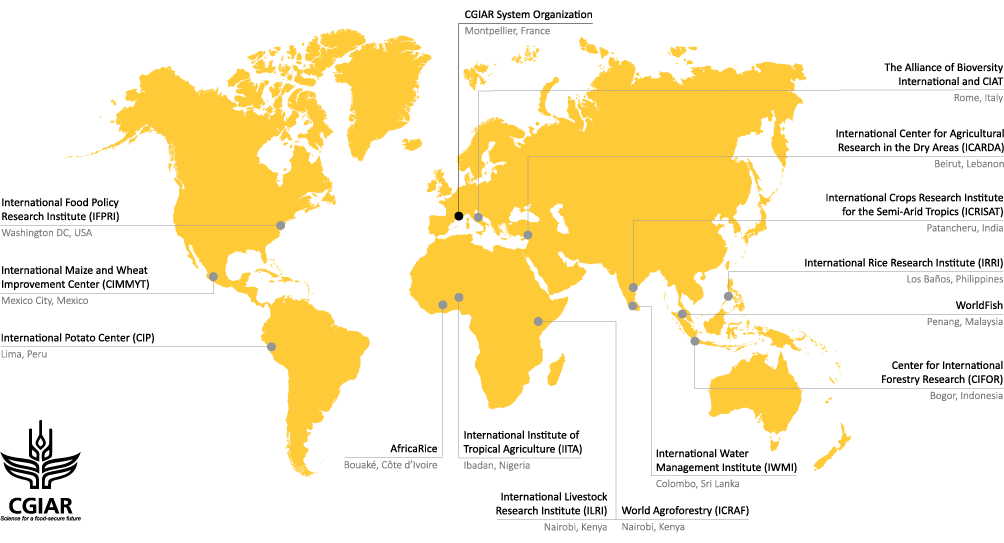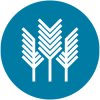Investing in global agricultural innovation
Australia has invested in CGIAR since its establishment in 1971. CGIAR is the world’s largest global agricultural innovation network, comprising 15 international agricultural research centres with more than 9,000 scientists who work mostly in low-income and lower-middle-income countries.
With 50 years of experience, a presence in 89 countries, and a deep knowledge of local customs, values and markets, the CGIAR system works closely with more than 3,000 partner organisations. These include national and regional research institutes, civil society organisations, academia and the private sector. CGIAR works towards a world free of poverty, hunger, malnutrition and environmental degradation. CGIAR is directly connected to the global development agenda and operates on an annual budget of about US$900 million.
The CGIAR research centres, shown in the map below, conduct world-class, interdisciplinary research that combines biophysical and social sciences to deliver development impact at scale. The research centres are responsible for hands-on research programs and operations guided by policies and research directions set by the CGIAR System Board with guidance from the CGIAR System Council.
A strong research-based relationship between ACIAR and CGIAR was forged soon after the establishment of ACIAR in 1982. With an amendment to the ACIAR Act in 1992, ACIAR was then mandated as Australia’s representative to CGIAR.
As a significant funder of CGIAR, Australia has high-level representation on CGIAR governance bodies, including the CGIAR System Council.
During 2023–24, CGIAR will undergo the final steps to becoming a more unified and integrated One CGIAR and begin the design of the next iteration of the One CGIAR research portfolio. The reform has involved a move from a network of independent international research centres, configured mostly around agricultural commodities, to a more cohesive structure under a common board.
ACIAR has actively contributed to the reform to ensure CGIAR is well-placed to deliver against both the UN Sustainable Development Goals and the Paris Agreement under the UN Framework Convention on Climate Change, as well as to attract new funder contributions.
Australia contributes to CGIAR alongside the United States of America, Germany, India, United Kingdom, European Commission and Mexico among many others, as well as significant donors, including the World Bank and the Bill & Melinda Gates Foundation. Further information on CGIAR governance and funding can be found on the CGIAR Governance and CGIAR Dashboards sites on the CGIAR website.
In addition to participating in the governance of CGIAR, Australia has many scientists who contribute as research leaders within the CGIAR and its research centres.
Figure 2.1 Location of the agricultural research centres of the CGIAR system
Source: CGIAR
CGIAR investment 2023–24
Australia, through ACIAR, provides restricted project funds and unrestricted core funds (designated and undesignated) to CGIAR. Restricted funding is delivered through specific research projects by individual centres of the CGIAR network. Unrestricted funding constitutes more than half of Australia’s total support to CGIAR. Unrestricted funding is reviewed annually and in 2023–24 will be approximately A$17 million (Table 1.3).
The CGIAR research portfolio strives for global and regional impact by organising its work around 3 Action Areas:
- Systems Transformation
- Resilient Agrifood Systems
- Genetic Innovation.
These Action Areas align with the CGIAR 2030 Research and Innovation Strategy, which aims to ensure that research provides real solutions for development.
The strategy has 7 implementation approaches:
- embracing a systems transformation approach
- leveraging ambitious partnerships for change
- positioning regions, countries and landscapes as central dimensions of partnership, worldview and impact
- generating scientific evidence on multiple transformation pathways
- targeting risk management and resilience as critical qualities for food, land and water systems
- harnessing innovative finance to leverage and deliver research through new investment and funding models
- making the digital revolution central to our way of working.
The new One CGIAR research portfolio, centred on transforming food, land and water systems in a climate crisis, is well underway, with the first year of results now available on the CGIAR Results Dashboard.
The 2023–24 year is shaping up to be pivotal for CGIAR with the implementation of the 2030 Research Strategy and delivery of impact on the current research portfolio, while beginning to design the focus of research beyond 2024.
To ensure research excellence and value for investment in CGIAR for Australia, during 2023–24 ACIAR will:
- participate at the highest levels of governance of the CGIAR system, through membership and leadership on the CGIAR System Council, the Strategic Impact Monitoring and Evaluation Standing Committee and numerous other advisory groups
- continue our collaboration with other donors to CGIAR through participation in multi-funder activities that align with ACIAR strategy and Australian interests
- coordinate Australian engagement with CGIAR, including consultation with the Department of Foreign Affairs and Trade (DFAT) and other Australian organisations, primarily through the CGIAR Australian Leadership Group, established by ACIAR in 2015
- engage ACIAR Research Program Managers in the technical oversight of CGIAR Research Programs and in strengthening our partnership with the CGIAR to achieve Strategic Change 6 of ACIAR 10-Year Strategy 2018–2027.
Impressive return on investment
CGIAR delivers impressive economic, social and environmental returns on research investment. A 2020 study calculated a benefit:cost ratio of 10:1 for CGIAR investment since 1961, which is primarily due to enhancing the yields of staple food crops in developing countries. There are additional less-easily measured payoffs, such as greater food abundance, cheaper food, reduced rates of hunger and poverty, and a smaller geographical footprint of agriculture. CGIAR research outputs have helped keep Australian farmers competitive in world markets by increasing yields and reducing costs.
A 2020 study calculated a benefit-cost ratio of 10:1 for CGIAR investment since 1961, which is primarily due to enhancing the yields of staple food crops in developing countries. There are additional less-easily measured payoffs such as greater food abundance, cheaper food, reduced rates of hunger and poverty, and a smaller geographical footprint of agriculture.
CGIAR germplasm has been incorporated into, and has greatly improved, Australian plant and livestock breeding programs. For example, 98% of all wheat grown in Australia is derived from CGIAR wheat germplasm. CGIAR germplasm is also prominent in improved varieties of sorghum, maize and chickpea in Australia.






